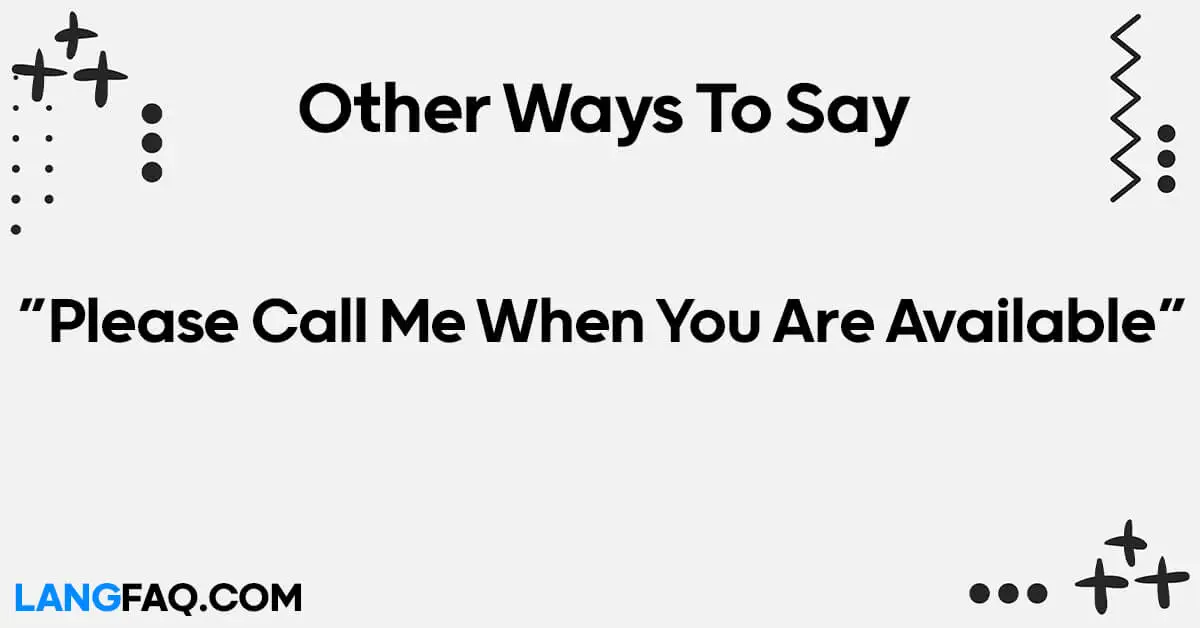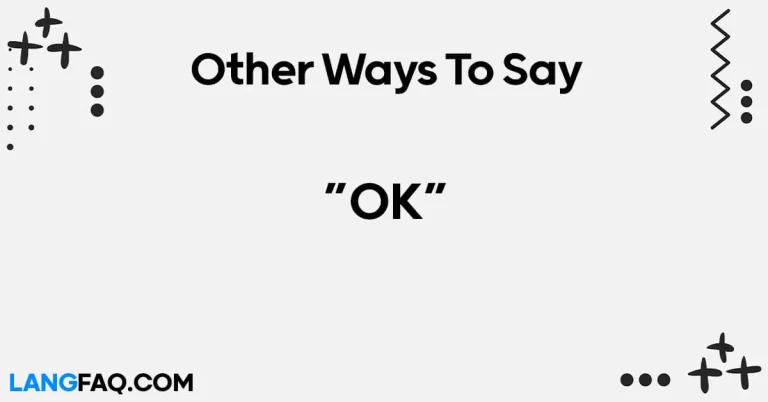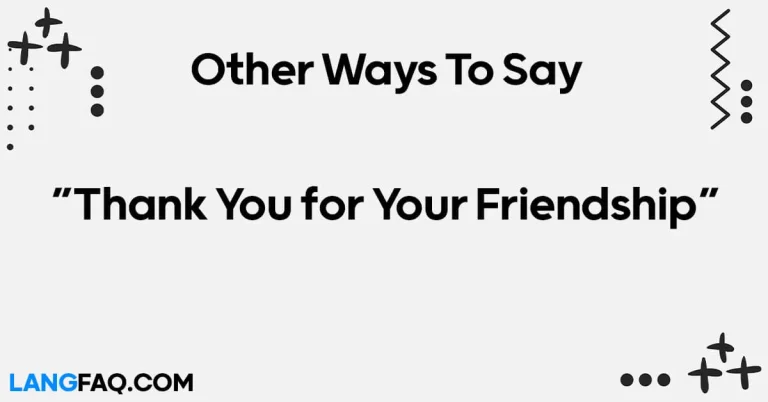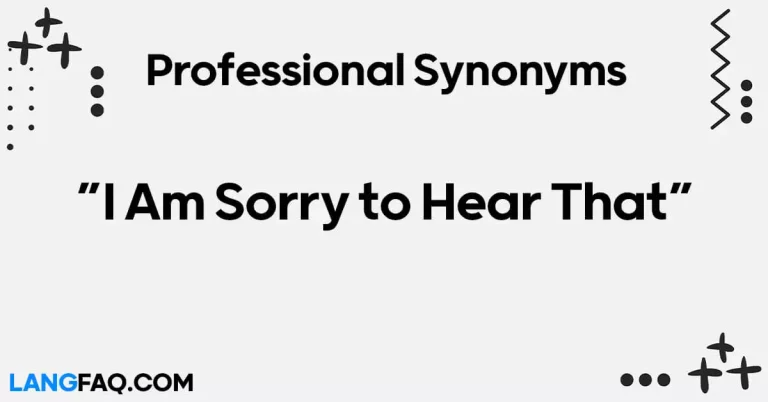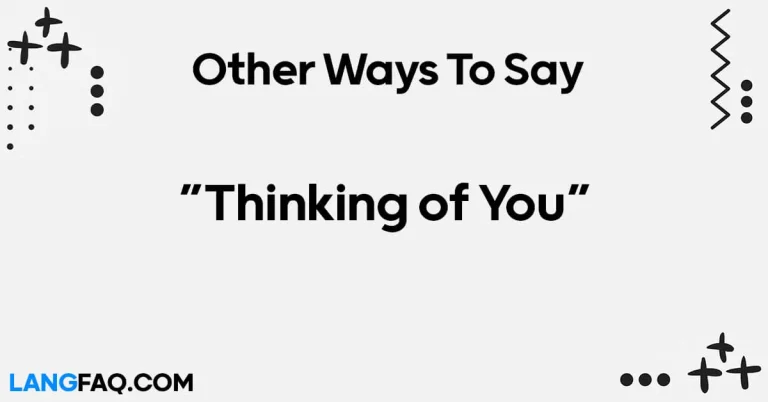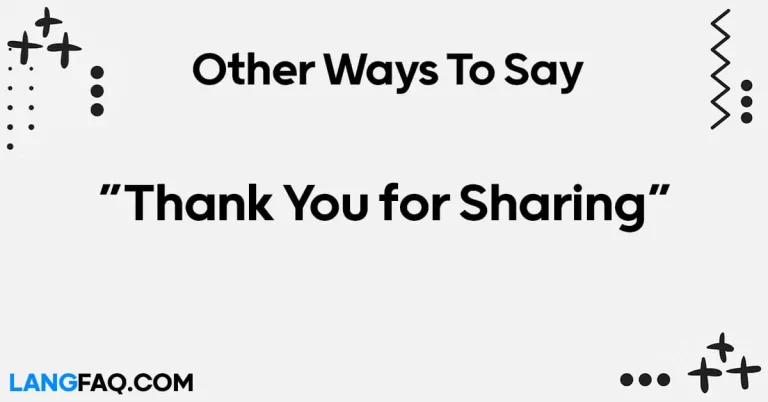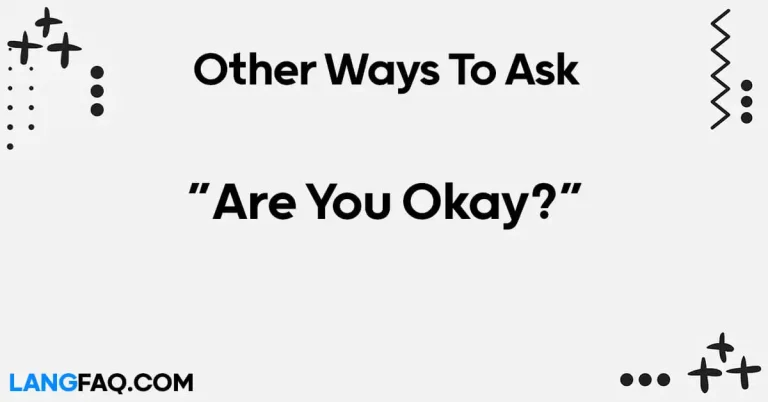Communication is a crucial aspect of our personal and professional lives. When it comes to conveying the need for a conversation, the phrase “Please Call Me When You Are Available” might seem repetitive. In this article, we’ll delve into 12 diverse expressions that serve the same purpose, offering you a range of options to enhance your communication.
12 Other Ways to Say “Please Call Me When You Are Available”
Here are 12 other ways to express “Please Call Me When You Are Available” in English:
- Reach out to me at your earliest convenience.
- Connect with me when you have a moment.
- Drop me a line when you’re free.
- Give me a shout when you can.
- Holler at me when you get a chance.
- Let’s touch base at your convenience.
- Ring me when you’re available.
- Give me a bell when you’re ready.
- Shoot me a call when you have time.
- Ping me when you’re free.
- Let’s have a chat when you’re available.
- I’m all ears whenever you’re ready.
Here’s a table with meanings and examples for the 12 alternatives to “Please Call Me When You Are Available”:
| Alternative Phrase | Meaning | Example |
|---|---|---|
| Reach out to me at your earliest convenience. | Urgently requesting a prompt response. | “Could you please reach out to me at your earliest convenience? I need your input on the project.” |
| Connect with me when you have a moment. | Asking for a call when the other party is free. | “Feel free to connect with me when you have a moment. I’d like to discuss the upcoming meeting.” |
| Drop me a line when you’re free. | Requesting a message or call when available. | “Whenever you have a break, drop me a line. I have some updates to share.” |
| Give me a shout when you can. | Requesting attention or communication. | “If you could, give me a shout when you can. I’d like to discuss the upcoming event.” |
| Holler at me when you get a chance. | Asking for a call when the opportunity arises. | “Whenever you get a chance, holler at me. I have some exciting news to share.” |
| Let’s touch base at your convenience. | Suggesting a meeting at the other person’s convenience. | “How about we touch base at your convenience to go over the project details?” |
| Ring me when you’re available. | Requesting a call when the person is ready. | “Feel free to ring me when you’re available. I’d like to discuss the agenda for the meeting.” |
| Give me a bell when you’re ready. | Informal way of asking for a call when the person is prepared. | “Whenever you’re ready, give me a bell. We can go over the proposal together.” |
| Shoot me a call when you have time. | Informal request for a call when the other party is available. | “Hey, shoot me a call when you have time. Let’s catch up on the latest developments.” |
| Ping me when you’re free. | Suggesting a quick message or call when the person has time. | “Feel free to ping me when you’re free. We can discuss the details then.” |
| Let’s have a chat when you’re available. | Informal invitation for a conversation when the person is ready. | “Whenever you’re available, let’s have a chat over coffee.” |
| I’m all ears whenever you’re ready. | Expressing openness to a conversation whenever the person is prepared. | “I’m all ears whenever you’re ready. Let’s discuss your ideas for the upcoming project.” |
Conclusion: Incorporating diverse phrases to request a call enhances your communication skills. These alternatives offer flexibility and can be tailored based on the level of formality and urgency. Experimenting with these expressions can make your communication more engaging and effective.
Is It Correct to Say “Please Call Me When You Are Available”?
Yes, the phrase “Please call me when you are available” is grammatically correct and commonly used in English. It is a polite and formal way to request someone to contact you at a time when they are free or have the availability to do so.
The sentence structure is clear and follows proper English conventions, with the polite request (“Please call me”) followed by the condition or timing (“when you are available”). This sentence is suitable for various contexts, both in professional and personal communication, where you want to convey a sense of courtesy and respect for the other person’s schedule.
If you are looking for alternative ways to express the same sentiment, as per the instructions provided earlier, there are various phrases you can use. Each alternative phrase carries its own tone and level of formality, allowing you to tailor your request based on the specific context and your relationship with the person you are communicating with.
Professional Mail Example With “Please Call Me When You Are Available”
Subject: Urgent: Project Collaboration Discussion
Dear [Recipient’s Name],
I trust this email finds you well. I am reaching out regarding our ongoing project and would greatly appreciate the opportunity to discuss some crucial aspects with you.
Could you please call me when you are available? Your insights are integral to the success of this project, and I believe a brief conversation would help streamline our efforts and ensure we are aligned in our approach.
I understand you have a busy schedule, and I genuinely value your time. Your prompt attention to this matter will contribute significantly to our project’s progress.
Thank you for your cooperation, and I look forward to our conversation.
Best regards,
[Your Full Name] [Your Position] [Your Company] [Your Contact Information]
Reach Out to Me at Your Earliest Convenience
In the fast-paced world of business, conveying urgency without sounding demanding is an art. The phrase “Reach out to me at your earliest convenience” strikes a balance between formality and the need for a prompt response. This expression is versatile, fitting into both professional and personal communication.
When to Use:
- Professional Context: When communicating with colleagues, superiors, or clients regarding time-sensitive matters.
- Personal Context: When reaching out to friends or acquaintances for important matters.
Example Sentence:
“Dear [Recipient’s Name], I hope this message finds you well. Could you please reach out to me at your earliest convenience? I require your input on the upcoming presentation. Thank you.”
Email Sample:
Subject: Urgent: Need Your Input on Presentation
Dear [Recipient’s Name],
I trust this email finds you well. I’m reaching out to ask if you could kindly reach out to me at your earliest convenience. Your expertise is crucial for the success of our upcoming presentation, and I value your insights. Your prompt response is highly appreciated.
Thank you, [Your Full Name]
Variations:
- Colleagues: “Could you please reach out to me at your earliest convenience? Your input is crucial for the team project.”
- Friends: “Hey! Can you reach out to me at your earliest convenience? I’ve got some exciting news to share.”
- Mentor-Mentee: “Dear [Mentor’s Name], I would appreciate it if you could reach out to me at your earliest convenience. I could use some guidance on my current project.”
Pros and Cons:
Pros:
- Conveys urgency without being overly demanding.
- Maintains a formal tone suitable for professional communication.
Cons:
- May be considered too formal for very casual relationships.
Dictionary Insights:
According to Cambridge Dictionary, “at your earliest convenience” is a polite way of saying “as soon as possible.” It is often used in a formal context to request timely action.
Usage Tips:
- Use this phrase judiciously in professional settings to avoid sounding excessively formal in casual relationships.
- Ensure clarity in your message, specifying the nature of urgency for a prompt response.
Connect with Me When You Have a Moment
Balancing professionalism and approachability is essential in many workplace communications. “Connect with me when you have a moment” provides a friendly alternative to a direct call to action, making it suitable for various scenarios.
When to Use:
- Professional Context: When requesting time for a discussion or collaboration.
- Personal Context: When reaching out to friends or colleagues for a casual conversation.
Example Sentence:
“Hi [Recipient’s Name], I hope you’re doing well. Whenever you have a moment, could you connect with me? I’d like to discuss the details of the upcoming project.”
Email Sample:
Subject: Quick Connect for Project Discussion
Hi [Recipient’s Name],
I trust this message finds you in good spirits. I wanted to touch base and see if you could connect with me when you have a moment. There are a few key aspects of the project I’d love to discuss with you. Looking forward to your insights.
Best regards, [Your Full Name]
Variations:
- Colleagues: “Hey [Colleague’s Name], can you connect with me when you have a moment? I need your thoughts on the client presentation.”
- Friends: “Hi [Friend’s Name], let’s catch up! Connect with me when you have a moment, and we can plan something fun.”
- Mentor-Mentee: “Dear [Mentor’s Name], could you connect with me when you have a moment? I’d appreciate your guidance on my career path.”
Pros and Cons:
Pros:
- Strikes a balance between formality and friendliness.
- Suitable for various relationships and contexts.
Cons:
- May not convey a sense of urgency in time-sensitive matters.
Dictionary Insights:
Cambridge Dictionary suggests that “connect with someone” means to communicate with them, especially in a way that creates a positive relationship.
Usage Tips:
- Use this phrase when seeking collaboration or input in a friendly manner.
- Clarify the purpose of the connection to set expectations for the recipient.
Drop Me a Line When You’re Free
When a more casual and informal approach is appropriate, “Drop me a line when you’re free” offers a friendly invitation for communication. This phrase is versatile, suitable for both professional and personal interactions.
When to Use:
- Professional Context: Informal communication within a team or with colleagues.
- Personal Context: When reaching out to friends or acquaintances for a laid-back conversation.
Example Sentence:
“Hey [Recipient’s Name], hope you’re well! Whenever you’re free, could you drop me a line? I’d love to catch up on the latest news.”
Email Sample:
Subject: Quick Catch-up Invitation
Hey [Recipient’s Name],
Trust you’re doing awesome! Just wanted to drop a quick note – whenever you’re free, could you drop me a line? I’ve got some exciting updates to share, and I’d love to hear what’s new with you.
Cheers, [Your Full Name]
Variations:
- Colleagues: “Hey team, whenever you’re free, drop me a line. Let’s discuss any thoughts or suggestions you might have.”
- Friends: “Hi [Friend’s Name], it’s been a while! Drop me a line when you’re free, and we can plan something fun.”
- Mentor-Mentee: “Dear [Mentor’s Name], whenever you’re free, could you drop me a line? I’d appreciate some advice on my current project.”
Pros and Cons:
Pros:
- Conveys informality and friendliness.
- Suitable for various relationships and environments.
Cons:
- May not suit highly formal or urgent situations.
Dictionary Insights:
According to Cambridge Dictionary, “drop someone a line” means to write someone a short letter or message.
Usage Tips:
- Use this phrase when seeking a casual and laid-back conversation.
- Keep the message brief and to the point, maintaining a friendly tone.
Give Me a Shout When You Can
Injecting a bit of colloquialism into your communication, “Give me a shout when you can” adds a friendly and approachable touch to your request for a call. This phrase is particularly effective in informal settings.
When to Use:
- Professional Context: Informal communication within a team or among colleagues.
- Personal Context: When reaching out to friends or family for a casual catch-up.
Example Sentence:
“Hi [Recipient’s Name], just checking in! Whenever you can, could you give me a shout? I’ve got something exciting to discuss.”
Email Sample:
Subject: Quick Check-in Request
Hey [Recipient’s Name],
Hope you’re doing well! Just a quick one – whenever you can, could you give me a shout? I’ve got some updates to share and would love your thoughts.
Best, [Your Full Name]
Variations:
- Colleagues: “Hey team, whenever you can, give me a shout. Let’s huddle up for a quick brainstorming session.”
- Friends: “Hi [Friend’s Name], it’s been ages! Give me a shout when you can, and let’s plan a get-together.”
- Mentor-Mentee: “Dear [Mentor’s Name], whenever you have a moment, could you give me a shout? I’d appreciate some advice on my career path.”
Pros and Cons:
Pros:
- Adds a friendly and casual tone to the communication.
- Suitable for both professional and personal interactions.
Cons:
- May be considered too informal in highly formal settings.
Dictionary Insights:
Cambridge Dictionary defines “give someone a shout” as to contact someone, especially by calling loudly.
Usage Tips:
- Use this phrase in settings where informality is welcomed.
- Ensure the recipient understands the nature of the shout, whether it’s a quick call or a more detailed conversation.
Holler at Me When You Get a Chance
Infusing a touch of colloquialism and warmth, “Holler at me when you get a chance” is an excellent choice for informal communication. This phrase is perfect for friendly and casual conversations, providing a relaxed invitation to connect.
When to Use:
- Professional Context: Informal communication within a relaxed work environment.
- Personal Context: Reaching out to friends or close acquaintances for a laid-back discussion.
Example Sentence:
“Hey [Recipient’s Name], whenever you get a chance, could you holler at me? I’ve got some news to share and would love to catch up.”
Email Sample:
Subject: Quick Chat Request
Hey [Recipient’s Name],
Hope you’re doing fantastic! Just dropping a quick note – whenever you get a chance, could you holler at me? I’ve got some exciting updates, and I’d love to hear what you’ve been up to.
Cheers, [Your Full Name]
Variations:
- Colleagues: “Team, whenever you get a chance, holler at me. Let’s plan a casual team-building session.”
- Friends: “Hi [Friend’s Name], long time no chat! Holler at me when you get a chance, and we can grab a coffee.”
- Mentor-Mentee: “Dear [Mentor’s Name], whenever you have a moment, could you holler at me? I’d appreciate some guidance on my current project.”
Pros and Cons:
Pros:
- Conveys friendliness and approachability.
- Ideal for casual and informal relationships.
Cons:
- May not be suitable for highly formal or urgent situations.
Dictionary Insights:
According to Cambridge Dictionary, “holler” means to shout loudly, often to attract attention.
Usage Tips:
- Use this phrase when aiming for a laid-back and friendly conversation.
- Ensure the recipient understands the informal nature of the holler.
Let’s Touch Base at Your Convenience
When formality is essential, “Let’s touch base at your convenience” strikes the right chord. This phrase is particularly effective in professional settings, maintaining a formal tone while expressing the desire for a meeting.
When to Use:
- Professional Context: Scheduling meetings or discussions with colleagues, superiors, or clients.
- Personal Context: When maintaining a formal tone in communication with acquaintances.
Example Sentence:
“Dear [Recipient’s Name], let’s touch base at your convenience to discuss the project details. Your insights are invaluable, and I look forward to our meeting.”
Email Sample:
Subject: Meeting Request for Project Discussion
Dear [Recipient’s Name],
I trust this message finds you well. I would like to propose a meeting to touch base at your convenience and discuss the finer details of the project. Your expertise is crucial, and I believe our collaboration will significantly benefit from your insights.
Best regards, [Your Full Name]
Variations:
- Colleagues: “Team, let’s touch base at your convenience to review the project timeline. Your input is vital for our success.”
- Friends: “Hi [Friend’s Name], let’s touch base at your convenience and plan a weekend getaway. I value your thoughts on our trip.”
- Mentor-Mentee: “Dear [Mentor’s Name], could we touch base at your convenience? I’d appreciate your guidance on navigating my current challenges.”
Pros and Cons:
Pros:
- Maintains a formal tone suitable for professional communication.
- Communicates the desire for collaboration without imposing urgency.
Cons:
- May be considered too formal for very casual relationships.
Dictionary Insights:
Cambridge Dictionary defines “touch base” as to talk to someone for a short time to find out how they are or what they think about something.
Usage Tips:
- Use this phrase when scheduling formal meetings or discussions.
- Specify the purpose of the meeting to set clear expectations for the recipient.
Ring Me When You’re Available
Maintaining a classic touch, “Ring me when you’re available” is a timeless way to request a call, balancing formality and simplicity. This phrase is suitable for various settings, offering a courteous yet straightforward invitation to connect.
When to Use:
- Professional Context: Requesting a call from colleagues, superiors, or clients in a formal manner.
- Personal Context: When seeking a call from friends or family members with a touch of formality.
Example Sentence:
“Dear [Recipient’s Name], I hope this message finds you well. Could you please ring me when you’re available? I’d like to discuss the upcoming project and value your input.”
Email Sample:
Subject: Call Request for Project Discussion
Dear [Recipient’s Name],
I trust you’re doing great. I was hoping to discuss the upcoming project with you. Could you please ring me when you’re available? Your insights are crucial, and I look forward to our conversation.
Best regards, [Your Full Name]
Variations:
- Colleagues: “Team, could you ring me when you’re available? Let’s coordinate our efforts for the upcoming presentation.”
- Friends: “Hey [Friend’s Name], long time no talk! Could you ring me when you’re available? I’ve got some exciting news to share.”
- Mentor-Mentee: “Dear [Mentor’s Name], could you ring me when you’re available? I’d appreciate your guidance on a few career-related matters.”
Pros and Cons:
Pros:
- Classic and formal, suitable for various relationships.
- Conveys a sense of formality without being overly stiff.
Cons:
- May be considered too formal for very casual relationships.
Dictionary Insights:
Cambridge Dictionary states that “ring” is used informally to mean to telephone someone.
Usage Tips:
- Use this phrase when formality is necessary but a touch of simplicity is also desired.
- Clarify the purpose of the call to provide context for the recipient.
Give Me a Bell When You’re Ready
Infusing a touch of humor into your communication, “Give me a bell when you’re ready” adds a lighthearted and friendly vibe to your request for a call. This phrase is ideal for informal and casual settings where a relaxed tone is appreciated.
When to Use:
- Professional Context: Informal communication within a team or among colleagues.
- Personal Context: When reaching out to friends or family members for a friendly chat.
Example Sentence:
“Hi [Recipient’s Name], hope you’re doing well! Whenever you’re ready, could you give me a bell? I’ve got some interesting updates to share.”
Email Sample:
Subject: Quick Call Invitation
Hey [Recipient’s Name],
I hope this message brings a smile to your face. Whenever you’re ready, could you give me a bell? I’ve got some exciting news and can’t wait to catch up.
Cheers, [Your Full Name]
Variations:
- Colleagues: “Team, whenever you’re ready, give me a bell. Let’s have a quick check-in on our project progress.”
- Friends: “Hey [Friend’s Name], give me a bell when you’re ready. I’m in the mood for a good conversation and could use your company.”
- Mentor-Mentee: “Dear [Mentor’s Name], whenever you have a moment, could you give me a bell? I’d appreciate your advice on a few career decisions.”
Pros and Cons:
Pros:
- Adds a touch of humor and informality to the communication.
- Ideal for casual and relaxed relationships.
Cons:
- May not be suitable for highly formal or urgent situations.
Dictionary Insights:
According to Cambridge Dictionary, “give someone a bell” means to telephone them.
Usage Tips:
- Use this phrase when aiming for a light and friendly tone in your communication.
- Ensure the recipient understands the informal nature of the bell.
Shoot Me a Call When You Have Time
Embracing modern and informal language, “Shoot me a call when you have time” offers a contemporary touch to your request for a conversation. This phrase is versatile, fitting seamlessly into both professional and personal settings.
When to Use:
- Professional Context: Informal communication within a team or with colleagues.
- Personal Context: When reaching out to friends or acquaintances for a laid-back discussion.
Example Sentence:
“Hey [Recipient’s Name], whenever you have time, could you shoot me a call? I’ve got some thoughts to share, and I’d love your input.”
Email Sample:
Subject: Quick Call Request for Collaboration
Hey [Recipient’s Name],
I hope this message finds you in good spirits. Just a quick one – whenever you have time, could you shoot me a call? I’m working on a project and could use your insights.
Thanks, [Your Full Name]
Variations:
- Colleagues: “Team, whenever you have time, shoot me a call. Let’s brainstorm some ideas for the upcoming campaign.”
- Friends: “Hi [Friend’s Name], long time no talk! Shoot me a call when you have time. I’ve got some exciting news to share.”
- Mentor-Mentee: “Dear [Mentor’s Name], whenever you’re available, could you shoot me a call? I’d appreciate your guidance on a few career decisions.”
Pros and Cons:
Pros:
- Embraces informal and contemporary language.
- Suitable for both professional and personal communication.
Cons:
- May not convey a sense of urgency for time-sensitive matters.
Dictionary Insights:
Cambridge Dictionary suggests that “shoot” can be informally used to mean to telephone someone.
Usage Tips:
- Use this phrase when aiming for a modern and relaxed tone.
- Specify the purpose of the call to provide context for the recipient.
Ping Me When You’re Free
Drawing from the world of technology, “Ping me when you’re free” adds a contemporary touch to your request for communication. This phrase is ideal for informal and casual interactions, offering a friendly and modern alternative.
When to Use:
- Professional Context: Informal communication within a tech-savvy team or with colleagues.
- Personal Context: When reaching out to friends or family members in a relaxed manner.
Example Sentence:
“Hi [Recipient’s Name], whenever you’re free, could you ping me? I’d love to catch up and hear about your latest adventures.”
Email Sample:
Subject: Quick Ping Request for Catch-up
Hey [Recipient’s Name],
Trust this email finds you well. Just a quick one – whenever you’re free, could you ping me? I’m eager to catch up and share some updates.
Cheers, [Your Full Name]
Variations:
- Colleagues: “Team, whenever you’re free, ping me. Let’s coordinate our efforts for the upcoming project.”
- Friends: “Hey [Friend’s Name], it’s been too long! Ping me when you’re free, and let’s plan a weekend hangout.”
- Mentor-Mentee: “Dear [Mentor’s Name], whenever you have time, could you ping me? I’d appreciate your advice on a few professional matters.”
Pros and Cons:
Pros:
- Infuses a contemporary and tech-savvy vibe into communication.
- Ideal for both professional and personal settings.
Cons:
- May not be universally understood, depending on the recipient’s familiarity with tech terminology.
Dictionary Insights:
Cambridge Dictionary defines “ping” informally as to send a message to someone electronically.
Usage Tips:
- Use this phrase in settings where a modern and informal tone is appreciated.
- Be mindful of the recipient’s familiarity with tech terms.
Let’s Have a Chat When You’re Available
Injecting a sense of informality and warmth, “Let’s have a chat when you’re available” provides a friendly invitation for a conversation. This phrase is versatile, suitable for both professional and personal interactions.
When to Use:
- Professional Context: Scheduling informal discussions with colleagues or superiors.
- Personal Context: When reaching out to friends or acquaintances for a friendly chat.
Example Sentence:
“Hey [Recipient’s Name], let’s have a chat when you’re available. I’ve got some ideas to run by you, and I’d love your input.”
Email Sample:
Subject: Casual Chat Invitation
Hi [Recipient’s Name],
Hope this email finds you well. Just wanted to reach out and suggest – let’s have a chat when you’re available. I value your insights, and I’m excited to discuss some upcoming projects.
Best regards, [Your Full Name]
Variations:
- Colleagues: “Team, let’s have a chat when you’re available. I’d love to hear your thoughts on the new strategy.”
- Friends: “Hi [Friend’s Name], it’s been too long! Let’s have a chat when you’re available. I’ve missed our conversations.”
- Mentor-Mentee: “Dear [Mentor’s Name], could we have a chat when you’re available? I could use your guidance on a few career decisions.”
Pros and Cons:
Pros:
- Conveys friendliness and approachability.
- Suitable for various relationships and environments.
Cons:
- May not convey a sense of urgency in time-sensitive matters.
Dictionary Insights:
According to Cambridge Dictionary, “chat” means to talk to someone in a friendly informal way.
Usage Tips:
- Use this phrase when seeking an informal and friendly conversation.
- Clarify the purpose of the chat to set expectations for the recipient.
I’m All Ears Whenever You’re Ready
Expressing openness and receptiveness, “I’m all ears whenever you’re ready” is a friendly and inviting way to suggest a conversation. This phrase is suitable for both personal and professional exchanges, adding a touch of warmth to your communication.
When to Use:
- Professional Context: Informal discussions within a team or with colleagues.
- Personal Context: When reaching out to friends or family members for a heart-to-heart talk.
Example Sentence:
“Hi [Recipient’s Name], just wanted to say I’m all ears whenever you’re ready. If there’s anything on your mind or if you just want to chat, I’m here for you.”
Email Sample:
Subject: Ready to Listen
Dear [Recipient’s Name],
I hope this message finds you well. I wanted to let you know that I’m all ears whenever you’re ready. Whether it’s work-related or if you just need someone to talk to, I’m here for you.
Best, [Your Full Name]
Variations:
- Colleagues: “Team, I’m all ears whenever you’re ready. If there are any concerns or ideas you want to discuss, feel free to reach out.”
- Friends: “Hi [Friend’s Name], I’m all ears whenever you’re ready. Let’s catch up soon and share our stories.”
- Mentor-Mentee: “Dear [Mentor’s Name], I’m all ears whenever you’re ready. Your guidance is invaluable, and I’m eager to hear your thoughts.”
Pros and Cons:
Pros:
- Conveys openness and willingness to listen.
- Adds a friendly and informal touch to communication.
Cons:
- May not be suitable for highly formal or urgent situations.
Dictionary Insights:
Cambridge Dictionary defines “all ears” as eagerly ready to listen.
Usage Tips:
- Use this phrase when expressing a genuine willingness to listen.
- Make it clear that you are available for any topic or concern.
FAQs
Q: Is it okay to use informal expressions in professional emails? A: While it depends on the corporate culture, it’s advisable to maintain a level of professionalism in most professional communications. However, a slight informality can be acceptable in certain contexts.
Q: Can I use these phrases in personal relationships as well? A: Absolutely! Many of these expressions work well in both professional and personal settings, allowing you to tailor your communication style based on the relationship.
Q: Are these alternatives region-specific? A: Not necessarily. These expressions are versatile and can be used in various English-speaking regions. However, it’s always good to be mindful of cultural nuances.
Q: How can I decide which phrase to use? A: Consider the context and your relationship with the person. For professional settings, opt for more formal expressions, while informal phrases work well in casual relationships.
Q: Are these alternatives suitable for written communication? A: Yes, many of these expressions can be seamlessly incorporated into written communication, including emails and messages.
Q: Is it essential to vary my communication style? A: Varying your communication style can enhance your interpersonal skills. Adapting to different situations and relationships is key to effective communication.
Conclusion
Enhance your communication repertoire by incorporating these 12 alternatives for “Please Call Me When You Are Available.” Tailor your expressions based on the context and build stronger connections through versatile and engaging communication.

